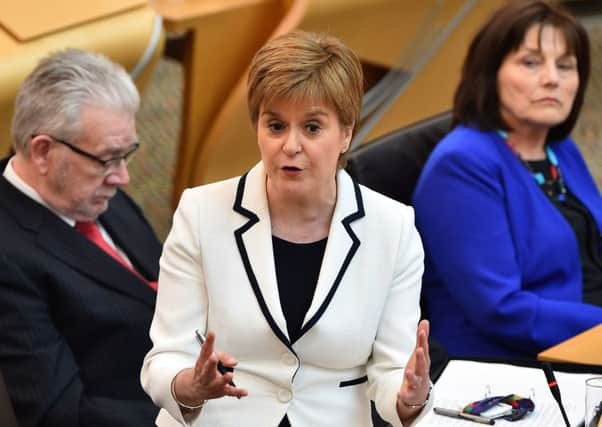Kenny MacAskill: Sturgeon did NOT just call for independence referendum by 2021


Preparatory legislation, citizens’ assemblies, even Uncle Tom Cobley and all, don’t a second referendum make. Some of that may be helpful but it doesn’t add up to another vote.
However, this was always about positioning for the party conference that’s coming and heading off internal dissent that’s growing.
Advertisement
Hide AdAdvertisement
Hide AdHolding another referendum’s problematic and those expecting an immediate poll delusional. However, mobilising the party and the wider independence movement’s essential and that’s been lacking.
This new statement neither delivers the former, not encourages the latter.
The talk of a poll before 2021 initially sounds positive but it’s heavily caveated and restricted by other factors. Will the UK have resolved its EU position by then? If that has been settled, can a poll even be carried out in time?
But it allows her to reassure the party this weekend that she’s undaunted and the light undimmed. Yet all this comes at a time of Britain’s greatest constitutional crisis in generations. Rather than seeking to maximise Scotland’s restricted hand, it’s to be another round of discussion and attempts at consensus building. It’s been clear though for quite some time that there was going to be no repeat of her calamitous call in 2017. As British parties break and fragment, the SNP debate transgender rights. Talk about fiddling while Rome burns!
The realignment on the referendum has been about repositioning the party and that has been causing growing dissent within and without. The route to a successful vote in a referendum, whenever it may now be held, was portrayed as through the targeting of ‘soft’ No voters. They’re being described variously as Tories who might be persuaded or folk from the rest of the UK who fear independence.
And so, the Scottish Growth Commission sets a strategy that a polling agency confirms the possibilities of and which the party leadership then endorses.
In all political parties, there’s a danger of taking your core support for granted and so it seems in the SNP. Those most supportive of independence last time were the young and the poor. Yet this strategy seems more geared towards corporate boardrooms or leafy suburbs.
I could perhaps have some sympathy for that if it was shown to be working but it most certainly isn’t. Corporate support seems at an all-time low and the disdain that even my good friend the financier and Yes supporter Peter de Vink has is evident.
Advertisement
Hide AdAdvertisement
Hide AdYet, as well as maintaining the support of those in housing schemes who flooded out to vote Yes in 2014, there’s also those who either didn’t vote or didn’t support independence last time. The margin of victory in deprived areas was huge but turnout less so.
In Quebec, the second vote saw an even higher participation level than first time around and that can be replicated here. But folk desperate for just hope won’t be inspired by a solidarity fund for the rest of the UK, let alone continued austerity.
Colin Fox, the leader of the Scottish Socialist Party, was correct that it’s a myth that the working class all voted Yes.
As he said, if that had been the case the outcome in Fife and Inverclyde would have been different. As with encouraging those who didn’t vote last time, the poor who were unpersuaded or fearful also need addressed.
As Nicola Sturgeon pursues her personal crusade to make Scotland the most gender equal, trans-friendly state in the universe, complaints are growing about public services.
Those who also seek change are speaking out as Extinction Rebellion shows. The SNP is in danger of positioning itself away not just from its own bedrock support but from those who could be mobilised to back it.
The EU elections will mask the issue, as the SNP will do well with a relatively low turnout and having a clear position on Brexit.
Later elections will be different if the poor decide the SNP aren’t for them and the young that they’re not radical enough.
They’ve been warned.
